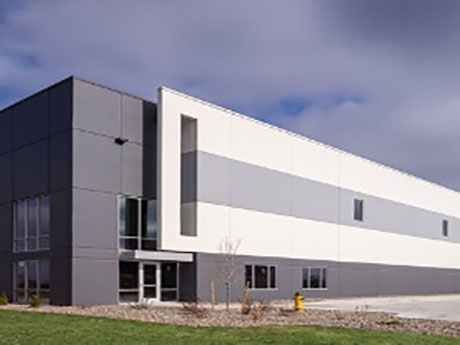By Jeremy Spillman and Corey Sedrel, Capstone Commercial
In a setting where I-80 and I-35 intersect to make up one of the busiest truck traffic intersections in the Midwest, Des Moines is well positioned to harness the power of manufacturing in Iowa to support several larger Midwest cities such as Chicago, Minneapolis, Kansas City, St. Louis and Omaha.
As we see change in our global supply chains, manufacturers and distributors look to states like Iowa to support these changing environments where we see these organizations moving away from the just-in-time model to just-in-case.

The transition to a just-in-case supply chain model began to form due to several supply chain-related issues we encountered during the pandemic. This led to higher demand for additional warehousing to be constructed.
Availability of large cube warehousing had been historically tight in Iowa since 2012 where most years carried vacancy rates of 2.5 to 4.5 percent annually. During 2022, there was 2.97 million square feet of warehouse/distribution space delivered to meet the increase in demand of rising inventories.
“From the construction standpoint, supply chain issues are subsiding, but there are still longer than normal lead times for certain trades and equipment. These lead times are still dictating construction schedules,” says Andy Moffitt of Ryan Cos.
“There is an interesting occurrence currently taking place in that there are a record number of construction completions but starts have plummeted compared with this time last year. For the most part this is due to uncertainty in the economy, tightening debt and equity requirements, and general cautiousness from investors. Most believe the demand is there to fill the current supply, and due to lack of starts it could lead to shortages of space in the future, but there is also a ‘wait and see’ dynamic given the amount of space that is becoming available.”

As shortages gave way to excess, 2022 was faced with declining consumer demand along with easing of our supply chain congestion. This resulted in inventories booming across most of the U.S.
To handle such a large swing in market sentiment along with a change in mindset of inventory management, developers across the Midwest raced to build enough new inventory to match the related demand for space. Flex space has also been a bright spot with vacancies dropping in half in just one year’s time.
There have been several notable warehousing/distribution developments that were delivered in 2022 that helped alleviate some of the added demand side pressures. Two of the larger developments were Altus Commerce Center developed by VanTrust, delivering two buildings in 2022 with the first facility offering 265,700 square feet and the second facility totaling 497,587 square feet.
Also in 2022, The Opus Group completed Swanwood Logistics Center. A single-tenant, 277,006-square-foot facility is now occupied by Brown Logistics and another speculative multi-tenant facility totals 296,700 square feet.
“The industrial market in Des Moines has shifted over the past six to nine months. Leasing and sales activity has slowed slightly but strong demand for space is still out there. Cap rates have risen along with interest rates making acquisitions and new construction more challenging to underwrite,” says Tyler Leo of ATI Group.
“2023 may be a little quieter than what we’ve gotten used to over the last 24 months, but I am still very bullish on Des Moines industrial in the short and long term. This minor slowdown we are experiencing in early 2023 will lead to a healthier more balanced industrial market in the metro.”
The first half of 2023 has seen a slowdown in deliveries, but signs point to a leveling off and not so much a drop-off compared with previous years. So far, we have seen 666,116 square feet delivered across all industrial facility types with 428,092 square feet coming from warehouse/distribution space.
As markets begin to normalize with rates stabilizing, we will see continued absorption in the Iowa market at a more sustainable rate.
Jeremy Spillman is president and Corey Sedrel is managing director with Capstone Commercial. This article originally appeared in the June 2023 issue of Heartland Real Estate Business magazine.


